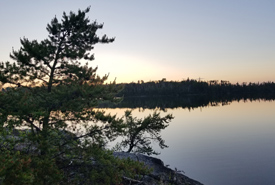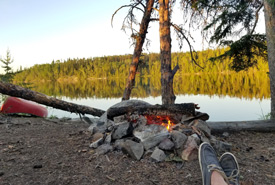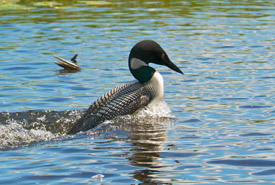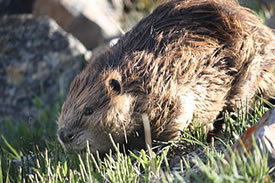A natural misconception

The lake near the campsite (Photo by Logan Salm/NCC staff)
The idea that nature is silent is a lie. Nature is loud, and sometimes obnoxiously so, especially when you’ve been paddling or hiking all day and just want to fall sleep. Don’t get me wrong: I’ll take the sounds of nature over honking cars and sirens any day, but there is often nothing quiet about nature.

Me listening to the sounds of nature by the campfire (Photo by Logan Salm/NCC staff)
On a recent camping trip in northern Saskatchewan, I zipped my tent closed and snuggled into my sleeping bag. As my tired eyes began to close, my ears were assaulted with a cacophony of noise. The appeal of camping is being in the middle of nowhere, but the noise filtering into my tent was a stark reminder that I was certainly somewhere. Maybe I was hundreds of kilometres from my home, but I was being reminded that I was in something’s home.
Only inches from my tent buzzed hundreds of insects, some mosquitoes, but mostly fish flies (caddisflies) and other aquatic insects that had taken to the air to breed. The buzzing grew softer and louder, depending on how the wind blew the bugs around the camp. No noise has ever made me more grateful for a one-millimetre thick tent to keep my sleep mosquito-bite-free.
Farther away from the insects, a light breeze caused the trees surrounding the campsite to rustle. The trembling aspens earned their name as their leaves trembled against each other. I could follow the waves of the gentle breeze as they pushed trees and insects in different directions.

Loon (Photo by Karol Dabbs)
It was so late in the evening that most of the songbirds had grown silent, but only temporarily before they would begin singing again right before daybreak. Instead, they had largely been replaced by the melancholy call of a loon. You would think that this unique call would lull you to sleep, but what started as one loon grew to two, then three and then maybe more. With calls reverberating across the water of the nearby lake, it was hard to distinguish one loon from another as their mournful echos slowly faded into the distance.

Beaver (Photo by Makedocreative/Wikimedia Commons)
The loons weren’t the only ones fighting for attention. A beaver circled the peninsula where the campsite was, stopping to slap its tail on the water every few moments. We were not far from its lodge and it was hard not to think that it was yelling at us for sleeping in its backyard. More likely, it was just completing a nightly ritual passed down from its ancestors, one that ceremonially ends every day in this part of the world.
Far in the distance, the last sound that my ears could pick up before falling asleep was the howl of a canine. It was hard to tell whether it was a coyote, wolf or some hunter’s dog. Was it a lone wolf proclaiming its existence to the world, perhaps? Was I the only one who heard it? But then I remembered that the loon, the beaver and all of nature had been speaking as well as listening.
A loud ecosystem usually means a healthy ecosystem. All that noise meant that life was rich and thriving outside of my little tent. These weren’t the random noises of traffic or the bustle of the city. Instead, it was life saying, “We are here, we are alive.” The next time you’re out in nature, listen carefully. You’ll realize that you aren’t in the middle of nowhere, but in the centre of everything.
Did You Know?
Roots is helping to protect Canadian habitat and the species that they sustain, including beavers. Find out how, here.


